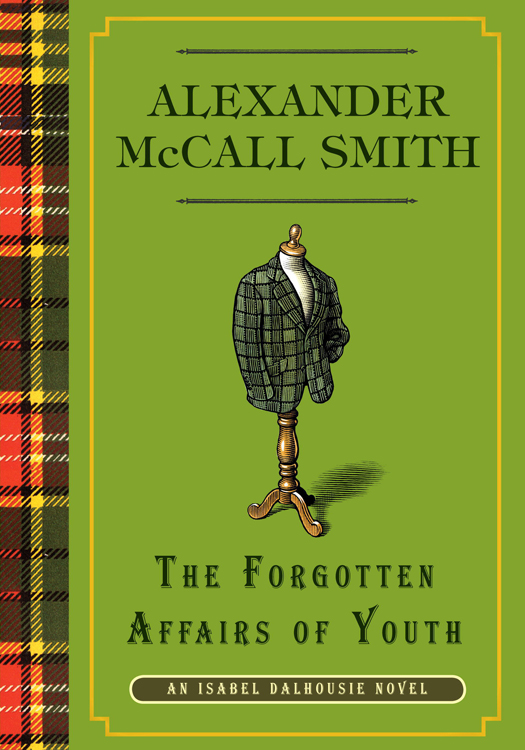
The Forgotten Affairs of Youth
Isabel Dalhousie Series, Book 8
کتاب های مرتبط
- اطلاعات
- نقد و بررسی
- دیدگاه کاربران
نقد و بررسی

October 31, 2011
You needn’t be a series-long admirer of Isabel Dalhousie to be beguiled by this curious philosopher and casual sleuth. In this eighth installment—with the ruminating Edinburgh heroine steeped in devoted motherhood, impending marriage, and office and family intrigue—it might even help to be a stranger to her more daring exploits; here, No. 1 Ladies’ Detectives Agency series phenom McCall Smith has his quirky gumshoe stalking moral intrigue more doggedly than mystery. It’s Isabel’s mission to help a visiting Australian philosopher find her father after her adoptive parents and birth mother die. The task is deceptively easy and never comes close to matching the confounding mysteries of Isabel’s niece’s fickle heart, the wisdom of ratting her out to health officials for a batch of toxic mushrooms, the impermanence of the greatest love of her life, or how to raise her adorable toddler with fiancé Jamie. Isabel believes only the examined life is worth living, and fearlessly so: “she would never accept things as they were. That was what made her do what she did—practice philosophy—and what made her... do battle for understanding, for sympathy, for love; in small ways... that cumulatively made a difference.” It makes Isabel a heroine worth following, even through this more quiet, reflective foray.

November 15, 2011
Edinburgh philosopher Isabel Dalhousie's cases often register low on the crime meter, but this one--the search for a new acquaintance's father--is 100 percent felony-free. It is not, however, free of Isabel's trademark ethical dilemmas. Should she warn her niece Cat that Sinclair, the Adonis who's filling in at her deli, is obviously unsuitable as a romantic partner? Should she invest in West of Scotland Turbines on the advice of her housekeeper's medium? What should she do when Professor Robert Lettuce, who persists on the editorial board of the Review of Applied Ethics, accepts on his own initiative an essay written by his nephew Max? And where did Charlie, the 2-year-old son of Isabel and her fiancé, bassoonist Jamie, pick up the nasty word he was heard using in his playgroup? All these questions, however, take a back seat to Australian philosopher Jane Cooper's request that Isabel help her find the man who impregnated her mother, Clara Scott, while she was still at university. Clara, long dead in a car crash, can be no help, and Isabel's far from certain that the man who took such pains to avoid leaving a paper trail so long ago will want to be part of Jane's life now. Isabel agrees to investigate anyway because it's the right thing to do, and then has to deal with the quest's unexpected complications using exactly the same moral lodestar. The woolliest of Isabel's eight adventures (The Charming Quirks of Others, 2010, etc.) at times seems little more than a catalogue of its heroine's always principled errors and misjudgments. But it shows again, and handsomely, the most lovable feature of Edinburgh: "Everything is…connected somehow."
(COPYRIGHT (2011) KIRKUS REVIEWS/NIELSEN BUSINESS MEDIA, INC. ALL RIGHTS RESERVED.)

June 1, 2011
Middle Eastern terrorists who think they're angels plan to blow the entire world sky-high, and their plan hinges on kidnapping an American scientist who possesses a pair of ancient stones that reputedly allow one to talk with God. Only the scientist's wife can save him; she has psychic power over the stones. If you loved the author's The Secret Supper, you'll probably love this, too.
Copyright 2011 Library Journal, LLC Used with permission.

Starred review from December 1, 2011
In Taking Tea, McCall Smith says, I get accused of being a Utopian writer. People say I see the world through rosy spectacles. This criticism might seem best to apply to the Isabel Dalhousie series, of which this novel is the eighth. Isabel is the fortysomething, well-heeled editor of a philosophical review in Edinburgh. Early in the tale, as she's mentally recounting her blessingsa baby beyond the age when she could expect one, a handsome fianc' much younger than she, financial and professional independenceIsabel stops herself, fearing Nemesis. And this is where the Utopian criticism falls apart in the Dalhousie series and in Smith's other works. He focuses on the rose, surely, of well-ordered lives and in his good, striving main characters, but the worm is always on the rose, or crawling nearby (especially in the No. 1 Ladies' Detective Agency novels). Isabel does, after all, run the Review of Applied Ethics and confronts daunting ethical dilemmas, not just in the philosophical-ethical puzzles of her journal but also as she tries to help people who are caught up in tricky choices, whose unseen consequences can make or break the rest of their lives.This totally absorbing novel has as its primary focus the grip of the past, as Isabel helps a woman given up for adoption find her biological father. Isabel is everything you'd want in a philosopher, but she is also quirky and witty and made more human by the longing she still sometimes feels for a beautiful but bad love in her past. Far from being Utopian, The Forgotten Affairs of Youth is filled with both spires and spikes, like Edinburgh itself. HIGH-DEMAND BACKSTORY: McCall Smith is remarkably prolific, but the number of his books never seems to saturate his market. His adoring readers will queue up for this one, as they always do.(Reprinted with permission of Booklist, copyright 2011, American Library Association.)

























دیدگاه کاربران